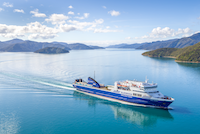New Zealand Eco Friendly Travel Guide
New Zealand is a beautiful country. Help keep our towns, cities, parks, beaches and native bush free from pollution and waste. Please also respect our unique flora and fauna. Be active and get involved in caring for the environment. It is everyone's responsibility.
Here are some tips on how to be eco-wise and leave gentle footprints when travelling in New Zealand.
Waste Friendly
Litter-free places are healthy places. Waste is hazardous if disposed of incorrectly and can attract pests and disease. Reduce the amount of waste you make and dispose of it responsibly.
Don't litter
- Always put all your rubbish in the bin provided, or take it away with you when you leave
Reuse and recycle
- Reuse plastic bags or try not to use them at all
- Seek out recycling centres for paper, glass, plastic and cans
- Ask your local i-SITE for the nearest recycling station
- Reuse your water bottles
Dispose of waste sensibly
- Only use a designated dump station
- Get a list of dumpstations from the i-SITE
Water Friendly
Lakes, rivers, beaches and harbours are our treasures and also the habitat of many plants, fish and bird species. When enjoying our waterways, please be sure to keep them free of rubbish, spills and introduced species, so that they can be enjoyed by generations to come. You can help by:
- Washing your gear between waterways to prevent the spread of unwanted pests like didymo (freshwater algae)
Water is a precious resource, and many New Zealand towns and cities experience water shortages during the summer months. You can help by:
- Using water sparingly
- Taking shorter showers
Energy Friendly
Using less energy helps reduce the amount of greenhouse gases in our air. This is because less fossil fuels are being burnt to produce electricity. You can help by:
- Switching off your electrical equipment when not in use
- Turning off the lights when you leave the room
- Asking tourism operators about their environmentally friendly practices
Travel Friendly
Around 20 percent of New Zealand's greenhouse gas emissions come from transport. You can help reduce this and save fuel by:
- Walking and cycling instead of driving
- Using public transport
- Reducing your speed on the open road
- Switching off your engine when stopped
- Choosing to buy or hire a fuel-efficient vehicle
- Offsetting your emissions by buying individual carbon credits. Check out the carboNZero Household Calculator
Travel safely
- New Zealand's weather changes rapidly, so be prepared
- Tell someone where you are going and when you plan to return
- Be firewise—observe fire bans and always check before lighting fires
- Ask your local Department of Conservation visitor centre or i-SITE for safety information and advice
Web Friendly
For more useful links see:
- Department of Conservation - Environmental care code
- NZ Mountain Safety Council - Outdoor Safety
- New Zealand Police - Visitor Safety
- New Zealand Fire Service
- Maritime Safety
- MetService - NZ's national meteorological service
- Tourism NZ - 100% pure New Zealand
- NZ Transport Agency - What's different about driving in New Zealand
Green Globe Responsible Travel Guide
If you are looking at going to the next step in helping keep New Zealand clean, green, environmentally friendly and resource sustainable then here's a few Green Globe questions you could ask tourism businesses.
Does the company have an environmental or sustainability policy?
This should be an indication that the operation is serious about its environmental impact and works towards minimising those impacts.
How are they contributing or assisting their community or local environmental and conservation projects?
See if you can ascertain if the business is assisting its local community or involved in any conservation work that relates to their operations. This can be done is a variety of ways, depending on the scale and size of the business. Do they have certificates or awards on display that highlight their positive efforts?
How many local people do they employ and do they source local products?
This is an indication that your spend is directly contributing to the local economy.
How do they treat waste water; provide energy for their buildings and reduce water consumption?
The use of natural resources such as water is becoming an increasing concern in many countries. It is important to do your part in reducing your resource use.
What guidance and advice is provided to guests on local cultures and customs?
This is especially good to find out as it will help you to understand indigenous cultures and customs and enhance your experience.
How would they recommend you get involved during your stay?
A company that is involved in conservation and charity work may be able to offer visitors the opportunity to contribute to the projects they support. This is one way that you can make a difference while on holiday.
Is the business a Green Globe participant?
Encouraging businesses to become Benchmarked or Certified with Green Globe helps to improve business in general, in particular the tourism industry which relies on the environment in so many ways. If your destination or tour operator is already a Green Globe participant, applaud their efforts and know that you have made the right choice!
Visit our Green Globe Web page for more information.













